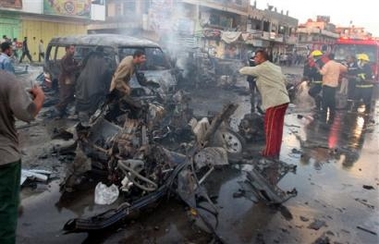80 Killed, over 200 Wounded in Black Sunday
Dawn estimates that mortar attacks and bombings in Iraq killed 80 persons on Sunday. Other sources suggest the number of wounded may exceed 200. Some 52 of the dead were killed by carbombings at markets in Shiite Sadr City, east Baghdad. The violence is aimed at provoking sectarian warfare, in hopes it would force the US out and pave the way for a coup by the guerrillas.
Al-Hayat interprets the attacks as a setback for Muqtada al-Sadr and his Mahdi Militia, which had announced that they would provide security in Sadr City.
Al-Zaman reports that the maneuverings of political blocs in Iraq during the past days did not produce any tangible resolution of the current crisis. Prime Ministerial candidate Ibrahim Jaafari attempted to reduce tensions by announcing that he is committed to the principle of federalism, rather than centralized government control.
The opening of parliament was moved up to Thursday, to avoid an overlap with the commemoration of the 40th day mourning period after the anniversary of the martyrdom of Imam Husayn, the grandson of the Prophet Muhammad.
After a meeting with Jalal Talabani, Ibrahim Jaafari held a press conference in which he remained committed to his candidacy for the post of prime minister. He said that the United Iraqi Alliance had elected him by party vote, and in parliamentary democracies, that is the way these things are settled. He did however attempt to mollify his Kurdish foes by reaffirming his commitment to all the articles of the constitution, one of which calls for a referendum in 2007 in Kirkuk, which the Kurds hope to win. The Kurdish politicians suspect that Jaafari is trying to figure out a way to keep them from getting oil-rich Kirkuk to join their provincial confederacy.
Adnan Mufti, the speaker of the Kurdistan regional parliament, told al-Hayat that he continued to suspect Jaafari of being unsympathetic to Kurdish states’ rights vis-a-vis the federal government.
Three years after the US military conquered Baghdad Airport, it is still not secure. US Embassy personnel have been forbidden to fly civilian airliners in and out of it after explosives were discovered there. And they still do those corkscrew landings, just in case there is a guerrilla around with a shoulder-held missile.
[Ar.] Al-Sharq al-Awsat reports that the Iraqi Labor Ministry has announced that unemployment in the capital has reached an unprecedented 132,000. Persistent unemployment is dangerous since it plays into the guerrilla insurgency. The unemployed can be given small stipends to join up, and their economic despair makes them easier to convince. But not that so much of Baghdad’s economy must be in the marginal sectors (peddling, smuggling, etc.) that I’m not sure what the statistic above really means.
SA also reports a study that examines the negative effect of the current situation on Iraqi women. They are 62% of the population, and face the practical effects of the unemployment and poverty mentioned above, which contributes to higher rates of divorce and abandonment, as well as of prostitution.
The Bush administration keeps crowing about having liberated Iraqi women. It is to weep.
Michael Gordon and Bernard Trainor give a whole host of reasons for which Donald Rumsfeld should be fired and if possible put on trial. They review the horrible mistakes made during the 2003 Iraq War, in which Rumsfeld showed repeated incomprehension that the Fedayee Saddam were getting up a guerrilla war against the US forces, and did bizarre things like cancelling the deployment of 16,000 troops and flying Ahmad Chalabi with 575 unarmed “freedom fighters” into the war theater, to give the latter a Karzai-like leg up in the race to become ruler of Iraq.
Revisionist historians of the world, unite! You have nothing to lose but Bush administration good will. Two historians dispute Bush’s and Cheney’s lies about how the Iraq War began.
For those with strong stomachs, here are the photos from Iraq that the American news organizations mostly decline to print. Warning: graphic and disturbing, just as you would expect from a war.
After spending $40 billion a year on intelligence, the American public discovers that some Chicago reporters with no more than an internet connection can turn up the names of 2600 CIA operatives, many of them supposedly covert, along with internal Agency phone numbers and the names of dummy air charter coporations used by the CIA.




 © 2025 All Rights Reserved
© 2025 All Rights Reserved